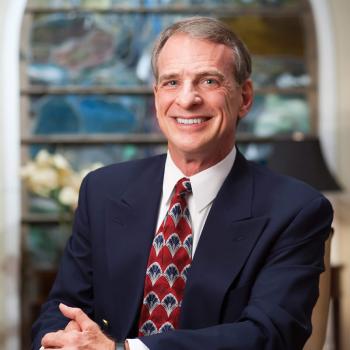It may seem unfair to use a particular pastor as an example of a much larger and far more profound problem in American Evangelicalism today. However, without desiring to “pile on” Andy Stanley, as one popular theologian put it, Stanley’s recent event at his Northpoint Community Church in Alpharetta, Georgia, provides too precise an example of a deeply rooted error to not use it as a illustrative case. The fact that Stanley’s conference affirming LGBTQ+ individuals and their relationships was entitled “Unconditional” captures the very essence of this error. And so we must do what another pastor calls “theological triage,” for if it is not the case that God’s love is “unconditional,” then that must be of the highest theological priority: there is a spiritual artery spouting bright, red blood which must be addressed with the greatest urgency and care.
What is Love?
Before I answer the implied question about God’s love in particular, which, if Christianity is true, would be infinite in degree and a maximal kind of love, let’s first consider love more abstractly. Or, to quote Haddaway, let’s ask the question: “What is love?” Once we get a reasonable, albeit incomplete conception of love, then we can think of love in both its human and divine forms. I say that we can have a reasonable conception of love, but not a complete one, because ultimately whatever love is it is not merely a concept. Nevertheless, let us venture forth where only fools dare tread.
When we think about love we must conceive of something like the highest possible good. We also must conceive of love as being “between” two things. This would be the case even in “self love,” since there is a reflexive operation that occurs within the self of thinking about and interacting with oneself. Usually this operation is carried out via a persistent and nearly unnoticeable inner dialogue. Still, a “dialogue” it is. It has often been thought that it is this very self-reflexivity that compromises the essence of humanity, or of being human. Self-reflexivity is minimally a necessary feature of being made in “God’s image and likeness,” and it is what most clearly distinguishes us from the animals.
So, most rudimentarily conceived, love is the highest good that can obtain between any two subjects. It is, to say, the highest form or quality of relationship. To use Buber’s language, love is the best that can be achieved between an “I” and a “Thou.” Whenever there is a true instance of such a relationship obtaining, we could say that both subjects involved experience something like a total fulfillment of their being– a complete integration of their particular self with their particular purpose for existing as a self: ontology unites with teleology in the genuine love relation; or what you are with what you were made to become.
Given this definition, which seems reasonable and roughly correct, we can now pose the question as to whether or not there are conditions that would make it impossible for this kind of relationship to obtain. If there are, then we may have a very serious problem with our conception of love if we think there really can be an “unconditional” form of it, even in regards to the divine. In other words, if there are conditions that make it impossible for love to obtain, then there may be reason to doubt that unconditional love exists since to love “unconditionally” just means that the ontology and teleology of two selves can unite in every possible circumstance and under every possible condition.
Are There Conditions to Love?
Let’s put this in a somewhat roundabout way, just in the hopes to make it stick. Before we answer the question directly, as to whether certain conditions are required for there to be an actual loving relationship, let’s instead ask the question of whether there can be unconditional “happiness” or “joy?” Can we be happy or joyful under any and all circumstance or conditions? Before we give the valid, but presumptuous, answer many Christians would give, referencing Paul’s response in Philippians 4:10-13, let’s make the conditions a bit different from Paul’s own.
For example, let’s assume that God does not exist, that the universe is made up of nothing more than mindless, impersonal energy and matter, that you are aware of all this, that you are experiencing intense physical pain at this very moment, that you are experiencing equally intense emotional pain at the same moment, and that you have just been told by those causing you such pain they have discovered a way to keep you alive indefinitely and in the very state you are in basically forever. Moreover, just to make the negative conditions complete, your captors have also found a way to wipe out any pleasant memories you may have from your prior life and that you could potentially “set your mind on” in those moments when you might be able to stop thinking about the immediate pain you in. Under such conditions, can we really imagine that one could still be happy or full of joy? Hardly.
As such, clearly there are conditions for happiness. Indeed joy comes in the morning (Psalm 30:5), if the morning comes. And so if there is an if behind some instance of happiness or joy, then it would seem to be the case that there is probably an if behind some real instance of love. Chesterton puts it this way, when speaking ironically about the “ethics of Elfland.” In any of the old fairy tales there is always an if when it comes to the attaining of joy, what Chesterton calls the “Doctrine of Conditional Joy”:
Touchstone talked of much virtue in an “if”; according to elfin ethics all virtue is in an “if.” The note of the fairy utterance always is, ‘You may live in a palace of gold and sapphire, if you do not say the word ‘cow;”; or ‘You may live happily with the King’s daughter, if you do not show her an onion.’ The vision always hangs upon a veto. All the dizzy and colossal things conceded depend upon one small thing withheld. All the wild and whirling things that are let loose depend on one thing that is forbidden.
G.K. Chesterton, Orthodoxy
Put more proverbially: “you can’t eat your cake and have it too.” Or, in more inspired language:
15 Then the Lord God took the man and put him in the Garden of Eden to cultivate it and tend it. 16 The Lord God commanded the man, saying, “From any tree of the garden you may freely eat; 17 but from the tree of the knowledge of good and evil you shall not eat, for on the day that you eat from it you will certainly die.”
In sum, for any creature there is always at least one condition for true happiness to obtain. There is no such things as an unconditional happiness, or joy. For human beings, happiness comes with a condition. You cannot do whatever you want, whenever or however you want it, nor could you have anything done to you, whenever or however, and yet still be happy. In the first example I made the first-person perspective that of the victim of circumstances. But, as we all know, we are often victims of our own devices. One can imagine a hellish scenario like the one above, but where victim and torturer are the same person.
Is There Unconditional “Human” Love?
If all happiness and joy depends on certain conditions, then how could love, which is a necessary condition for happiness and joy, be itself unconditioned? The answer is, it cannot. One obvious condition for love is the willingness of each person involved to engage in a relationship freely. Without a free choice to engage in a relationship with another, then whatever that relationship is, it is not a loving one.
That said, let’s assume that at the beginning of a relationship two people freely enter into a relationship they believe to be one of authentic love: they desire that through their relationship the being of the other self in the relationship and the purpose of the other self will be united. However, at some point during the relationship one of the persons, call him Harry, begins to notice that the other person, call her Sally, is acting in ways that are causing him distress. These acts are not directly aimed against Harry per se, but in doing them he begins to think something like “this isn’t good for Sally.” Harry tries to tell Sally that what she is doing is not good for her, but Sally continues anyway. Now Harry is hurt even more, because part of his life purpose is to help Sally fulfill her life purpose, and she is not allowing him to do this.
The situation escalates, and the end of the scenario is obvious to us all. Sally eventually leaves Harry and, in doing so, not only fails in loving him, but also fails in loving herself, since to be with Harry was a necessary condition for her to fulfill her life purpose. The question now emerges: “Can Harry still love Sally if Sally doesn’t want to be loved by Harry, which, is the same as saying ‘Sally doesn’t love Harry.’?”
At first glance, we may answer “yes, Harry can still love Sally.” Or, at least, we could say something like “Harry can having a loving disposition toward Sally, he can wish her no ill-will, he can hope for her best, etc.” But now let’s assume that Sally continues in her ways, and, in fact, becomes so wicked, so cruel and licentious that Sally seems like a completely different person than the Sally Harry once loved. For example, let’s say that Sally is like the torturers in the story above, who enjoys taking away the joys of others for the sake of her own gratification. Could Harry still love her now, under these conditions? For not only has Sally rejected Harry, which itself was a rejection of her own self-fulfillment, she has now gone on to try and rob others of the same possibility, the same chance for life fulfillment?
Under such conditions Harry cannot love Sally. This is clearly impossible. His disposition toward her must be one of indignation: for Sally is not only not loving Harry and helping him in fulfilling his purpose, she is not loving herself, nor is she loving others who also desire love, but instead is actually hurting their chances to achieve it. These are conditions that prevent Harry from loving Sally, and, in fact, may even force Harry to stop Sally from doing what she does.
But Certainly God Can Love Unconditionally, Even If We Cannot?
It may seem that God could love unconditionally in a way Harry can not. After all, God does not need another in order to find any fulfillment. God is pure fulfillment, or as Aquinas put it (in Aristotelian terms): actus purus. Or, in the biblical idiom, “God is light, and in Him there is no darkness” and “Jesus Christ is the same yesterday, today, and forever,” and “God is not a man that he should lie, or a son of man that he should change his mind,” and “For I the Lord do not change, therefore you, o children of Jacob, are not consumed.”
However, can God love someone who a) does not love God, b) does not seek to be loved by God, c) does not love themselves and d) does not love others? By the way, these all flow in a logical order: those who do not love God do not want to be loved by Him and, in not wanting to be loved by God, cannot love themselves. And, as even the most untrained pop-psychologist will tell you, those who cannot properly love themselves, certainly cannot really love others. In fact, those who don’t have a proper self-love, not a narcissistic self-love, often become quite oppressive to the rest of us.
Even if God does not need to be loved by Sally, as perhaps Harry does, this does not mean that God can love Sally (i.e., “us”) unconditionally. In fact, the Bible is quite clear that God doesn’t love us unconditionally, as is obvious from verses like these:
Therefore be imitators of God, as beloved children; 2 and walk in love, just as Christ also loved you and gave Himself up for us, an offering and a sacrifice to God as a fragrant aroma.
3 But sexual immorality or any impurity or greed must not even be mentioned among you, as is proper among saints; 4 and there must be no filthiness or foolish talk, or vulgar joking, which are not fitting, but rather giving of thanks. 5 For this you know with certainty, that no sexually immoral or impure or greedy person, which amounts to an idolater, has an inheritance in the kingdom of Christ and God.
Ephesians 5:1-5
If Christ loves us unconditionally not only would his sacrifice have been unnecessary, but Paul would also not have bothered going on in the very next verse to tell us about all the things we must give up as Christians. Why, after all? This list of things not to do implies there is some condition at play in the love relationship between us and God. That condition is what we call “repentance,” and without repentance we cannot be in a love relationship with God. And, if we are not in a love relationship with God, then we cannot be transformed by His love in such a way that our self, our ontological being, can be united with its true purpose, which just is the true meaning of true love.
Conclusion: All Love is Conditional, But Only God’s Love is True
The name of Andy Stanley’s conference, “Unconditional” is deceptive, because it implies that love, real love, can be unconditional. But it cannot. As such, Stanley seems to be leading his flock astray, at least if he is presenting God’s love as a love that is unconditional, a love that makes no demand of us at all, whatsoever. But what else could the title of Stanley’s conference be alluding to if not this? It is noteworthy that the very term “unconditional love” does not come from the Bible, but from popular psychology (likely from Carl Rogers).
But we must be clear. God’s love is unconditional in another sense, and that is God’s love doesn’t require of us any level or degree of moral goodness, or intellectual capacity or emotional stability to be found perfectly acceptable by Him so long as we make the free decision to accept Christ and be loved by God. The condition is the choice we make, not what we are like or what our identity is upon making the choice or what we have done prior to making it. God’s election of us is not conditioned on anything pertaining to us apart from this free choice to enter into His love. God’s love came before our love for Him.
However, once a love relationship between God and a man or woman obtains, there is a way to know whether it is genuine, or whether it is like the relationship that existed between Bob and Sally. Jesus tells his apostles quite clearly what the evidence for the genuineness of the love relationship between Him and His followers will be: “If you love me, you will keep my commandments” (John 14:15).
In his closing sermon on October 1, Andy Stanley said that those same-sex attracted Christians who have chosen to get married did not do so because “they’re convinced its biblical,” but because they desired, like us non-same-sex attracted Christians, “love, companionship and family.” But if this is the case, then we have Christians who are trying to do what Jesus said and follow his commands (a sign of our love for Jesus) and those who are not trying to do what Jesus said, assuming Jesus’ commands are given to us in the Bible (but where else could they be if not there?). Yet, according to Stanley, both those that are following Jesus’ commands and those not following them are in the same kind of loving relationship with Jesus.
This is simply incoherent.
It must be the case that those who are following Jesus’ commands, however imperfectly, are the ones who are at least trying to meet the condition necessary for genuine love to obtain, while those who are not trying to meet that condition are really not interested in a love relationship with Jesus. What Stanley seems to be doing is confusing people by not making it clear that God’s love is indeed conditional. It is conditional upon our response to God and, as Christians, upon our response to Jesus and His commands.
To be sure, this is regardless of how perfectly we might carry out that response in our lives, but the response must take the right form: an intentional and persistent choice to follow Jesus’ commands and, when we do not, to repent and try again. This pattern is, unlike Stanley’s claim, sustainable. It is sustainable not only for same-sex attracted or gender confused Christians, but for all of us: the angry Christians, the petty Christians, the arrogant Christians, the greedy Christians, and yes, the sexually burdened Christians. There are not two types of Christians: those that must repent and follow Jesus’ commands and those that get a pass from doing so.
However, this is not what Andy Stanley is teaching his flock, and, as such, Andy Stanley is not teaching about God’s love. Stanley may be teaching about something he calls love, but that something is not true love.

















